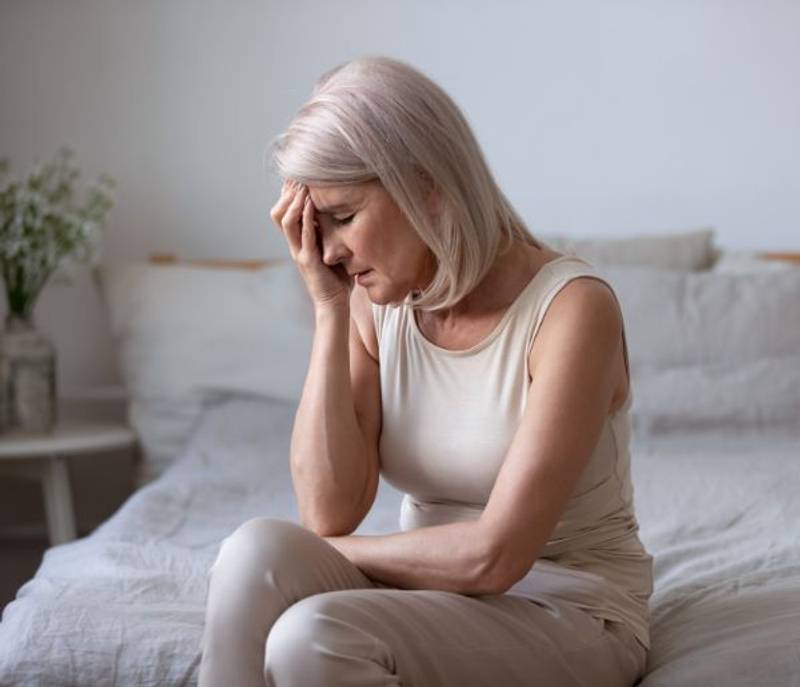.jpg?v=1729255314345&options=w_)
World Menopause Day: Symptoms, Support & Tips from a Nurse
October 18th marks World Menopause Day—a day dedicated to raising awareness about the experiences and challenges that come with menopause. Menopause is not just a personal health issue; it affects half the population, with significant impacts on workplaces, families, and society as a whole. Yet, too often, it's still a topic that many feel uncomfortable discussing. This World Menopause Day, it's time we break the silence and change the way we approach menopause by providing information, support, and solidarity.
We had the privilege of speaking with Tessa Barnard, a seasoned expert in women’s health, who has over 30 years of experience working in the NHS. Tessa has devoted her career to guiding women through the various stages of menopause. Her passion for empowering women and spreading knowledge is infectious, and her insights can help women better navigate this critical time in their lives.
Tessa’s journey into menopause care began after witnessing countless women struggle with a lack of information and support during menopause. She recognised the urgent need for specialised care that addresses the physical, mental, and emotional challenges that menopause brings. Tessa understands how difficult this phase can be—emphasising how menopause affects mental health, work life, and relationships—and aims to provide holistic care that acknowledges these challenges.
.jpg?v=1729254430472&options=w_800)
“25% will have hardly any symptoms and will sail through. 50% of us will have a mixed bag of symptoms that really do impact our quality of life. Another 25% will be severely affected. Sadly we do hear of women ending their lives because they can't cope with the symptoms of the menopause.”
- Tessa Barnard, Nurse & Menopause Practitioner
Tessa’s passion for empowering women and spreading knowledge is infectious, making her insights invaluable for navigating this critical stage of life. In this blog post, we’ll explore her key insights, practical tips, and the importance of breaking the silence on menopause.
Navigating Your Menopause Journey: Why Menopause Matters
What menopause does to your body is complex and varies for each woman, coming with a set of physical and emotional symptoms that can feel overwhelming if you’re not prepared. The symptoms of menopause—hot flushes, sleep disturbances, mood changes, and more—can significantly impact a woman’s quality of life, illustrating what menopause does to a woman beyond just the physical changes. But menopause doesn't just affect individuals. It influences our workplaces, families, and even our broader society. For that reason, it’s not just a women’s issue; it’s something that affects us all.
According to Tessa, raising awareness is the first crucial step. By understanding how menopause affects the body, both physically and emotionally, we can create an environment that provides the care, empathy, and support needed during this transition. Menopause is not a disease to be treated in isolation but rather a natural part of life that we should all acknowledge and accommodate.
During our conversation, Tessa highlighted several important aspects of menopause that need more public attention and awareness, including how menopause starts and progresses over time.
Menopause Affects Everyone
How menopause affects women extends beyond the individual—it impacts our families, workplaces, and society as a whole. As Tessa points out, by spreading awareness, we can make sure that women receive the support they need from those around them. Whether it’s understanding partners or supportive colleagues, raising awareness helps build the right networks for women to thrive. When families are aware of the physical and emotional challenges that menopause can bring, they are better equipped to offer support. This could mean more patience, helping out more with daily tasks, or simply being more empathetic when brain fog or hot flushes strike. Families are key players in providing the emotional and mental support that women need during this time. Menopause affects everyone, not just the individual experiencing it.
Workplace Support for Menopause
Many workplaces are still in the dark when it comes to menopause. This often means that women going through menopause don’t get the support or adjustments they need to do their jobs comfortably. Tessa advocates for workplace education, encouraging organisations to take an active role in supporting menopausal employees—whether through flexible working hours, creating menopause-friendly policies, or simply fostering a culture of empathy.

“Some workplaces are brilliant, but unfortunately we see the flip side to that where women are hugely unsupported. They’re being demoted, or even made redundant, because their performance has been affected through their menopause symptoms. Menopausal women can be really struggling in the workplace, and they don't feel there's anywhere to turn.”
- Tessa Barnard
Employers who understand the impact of menopause can implement small but meaningful changes that help women feel more comfortable. This could include providing a quiet, cool place for breaks, allowing flexible schedules to accommodate sleep disturbances, or educating management to be more understanding of the symptoms. By creating an inclusive workplace, organisations not only support their employees but also benefit from increased productivity, better morale, and reduced absenteeism.
Raising awareness at work can also encourage women to speak openly about their experiences without fear of being judged or penalised. Menopause-friendly workplaces foster a sense of trust, loyalty, and respect, and they help break down the barriers that make menopause a taboo topic.
Menopause Education from the Start
Tessa believes that education should start early—even at school age. This helps create a foundation of understanding and reduces the stigma around menopause. By starting conversations sooner, we can equip future generations with the knowledge to better understand menopause, paving the way for more open and supportive environments at home and in the workplace.
Schools can play an important role in this. Just as students learn about puberty, they should also learn about menopause. Normalising these conversations early on helps both boys and girls grow up understanding the natural phases of life, reducing shame or misunderstanding about what their mothers, aunts, or eventually they themselves might go through.
-(1).jpg?v=1729258783230&options=w_800)
“I think understanding and awareness is key. We should be educating people from an early age, but for women specifically, we need to think about the health consequences. As hormone levels drop, our health risks become more apparent. Things like chronic disease, metabolic health changes which can lead to cardiovascular disease, type 2 diabetes…”

“Women are more at risk of Alzheimer's, not to mention the loss of muscle mass and bone density, which leads to osteoporosis further down the line. These risks are all very much a part of and the picture of women's health and how that changes.”
- Tessa Barnard
Educating children and teenagers about menopause also means preparing future generations to be more empathetic partners, co-workers, and leaders. It’s about shifting the culture to one where menopause is openly acknowledged, understood, and supported.
Finding Your Voice
One of the most empowering pieces of advice Tessa offers is for women to find their voice. It can be challenging to speak up about symptoms or to advocate for yourself, especially when society tends to dismiss menopause as just “a woman’s issue.” Tessa encourages all women to be vocal about their needs—whether it’s seeking medical help, talking with family members, or asking for accommodations at work. Advocacy begins with speaking up.
It can be helpful to have open discussions with healthcare providers to understand all the available options for managing symptoms, including hormone replacement therapy (HRT), lifestyle changes, and other interventions. Women should feel empowered to ask questions, seek second opinions, and advocate for treatments that suit their unique needs. Being informed and assertive can make a big difference in getting the right care.
Talking with family members is equally important. Sharing what you’re going through can help them understand and be more supportive. Many women hesitate to bring up their symptoms at home, but Tessa insists that opening up is essential for creating a supportive environment. Whether it's explaining why you might need some extra rest or asking for a bit of space, communicating your needs clearly can foster empathy and patience from loved ones.
Support and Patience
Tessa also emphasises the importance of support from friends, family, and community. During menopause, leaning on others can make a huge difference. How menopause affects mental health can be profound, as symptoms often range from physical discomfort to significant mood changes, making it an emotional rollercoaster for many. Being surrounded by supportive people can help alleviate some of the burden.
Communities, both online and offline, can offer a sense of solidarity. Joining a support group, either locally or on social media, can provide a space where women can share their experiences, advice, and encouragement. Knowing that you’re not alone and that others understand what you’re going through can be incredibly comforting.
Being patient with yourself during this transition is also key—understanding that menopause is a journey that affects each woman differently and being gentle with oneself is crucial to making this period more manageable. It's about recognising that there will be ups and downs and allowing yourself grace through the process. Practising self-care, whether through relaxation techniques, exercise, or simply taking time for hobbies, is important for both mental and physical health.
Practical Tips for Thriving During Menopause
Beyond the support systems, there are practical steps women can take to better manage menopause symptoms and maintain a good quality of life. Here are a few tips inspired by Tessa’s insights:
Lifestyle Adjustments: Diet and exercise play a huge role in managing menopause symptoms. Eating a balanced diet rich in calcium and vitamin D can help support bone health, while regular physical activity can help manage menopause and weight gain, alleviate mood swings, and improve sleep.
Mindfulness and Relaxation: Stress can exacerbate menopause symptoms, so incorporating relaxation techniques such as yoga, meditation, or even simple breathing exercises can be highly beneficial. Mindfulness practices help in managing menopause and anxiety, improving sleep, and fostering a positive outlook.
Stay Cool: Hot flushes are one of the most common menopause symptoms. Dressing in layers, keeping a fan nearby, and avoiding hot or spicy foods can help manage sudden temperature changes.
Consider HRT: Hormone Replacement Therapy can be an effective way to manage symptoms for many women, but it’s important to consult with a healthcare provider to discuss the benefits and risks. Tessa stresses that every woman is different and HRT might not be right for everyone, and it is possible to navigate menopause without HRT, but it is worth exploring as an option.
Seek Professional Support: Don’t hesitate to reach out to healthcare professionals for guidance. Whether it’s your GP, a specialist, or a menopause clinic, professional advice can help you navigate symptoms and treatment options in a way that suits your unique needs.
Breaking the Silence: How You Can Help
World Menopause Day is an important reminder of why we need to talk more openly about the effects of menopause. Whether you’re going through it yourself or know someone who is, let’s start conversations that matter. Let’s educate ourselves, support those around us, and help to break the stigma that often surrounds menopause. By doing so, we can create a more understanding, supportive world for everyone. Together, we can create a community where every woman feels heard, informed, and empowered.
-(1)-copy.jpg?v=1729259950250&options=w_800)
In honour of Menopause Awareness Month, we're offering a special discount on our Menorise and Menorest menopause supplements—now available for nearly 50% off! These menopause support supplements are specially designed to support energy, hormone balance, restful sleep, and bone health—providing you with day and night support throughout the different stages of menopause.



